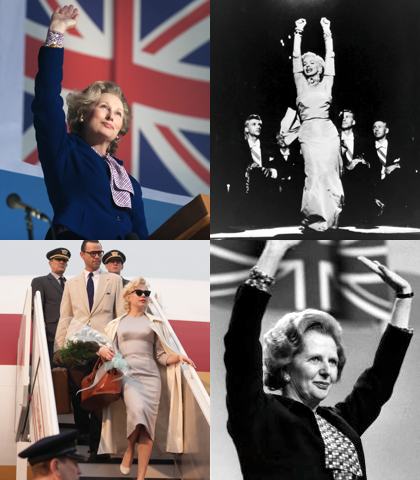Prize fighting
The Ms-fits

28 November 2011
This year’s Best Actress race inspires Nick James’s best clairvoyant impersonation
“And the Academy Award for Best Actress in an Icon-Impersonating Role goes to…” That’s what might as well happen next February. In this imaginary scenario, the broadcast screen would split, not into the usual five frozen smiles but just two, generations apart – Meryl Streep’s and Michelle Williams’s – thereby setting up an unlikely battle between Margaret Thatcher and Marilyn Monroe, between one lady not for turning and another for not turning up.
If Streep in The Iron Lady and Williams in My Week with Marilyn are the two front runners for the real Best Actress award, that’s largely because impersonation of a real person scores more highly in popular notions of what great acting is than any other mode of performance. Think of last year’s board-sweeping triumph for Colin Firth playing the stuttering King Edward VI in The King’s Speech.
This feeling of inevitability is not ruffled by the extraordinary strength of the opposition. This time around no-one can make the traditional justified complaint about the scarcity of good film parts for women because, for once, there are enough plausible Best Actress candidates to fill several golden envelopes. There’s Viola Davies, highly rated in The Help; Keira Knightley gives her finest performance to date as the hysteric Sabina Spielrein in A Dangerous Method; Glenn Close is in contention for playing a woman impersonating a man in the otherwise wretched Albert Nobbs; Kirsten Dunst’s persuasive incarnation of world-destroying depression in Melancholia is much-admired; Rachel Weiss has surpassed herself in The Deep Blue Sea; Jodie Foster is full of fire and brio in Polanski’s Carnage; Tilda Swinton turns herself inside out running the gamut of emotions in We Need to Talk About Kevin; consider the quiet poignant excellence of Yun Jeong-Hie’s magnificent performance in Poetry; Rooney Mara may yet amaze us in the eagerly anticipated US remake of The Girl with the Dragon Tattoo; and there are several more strong outsiders such as Olivia Colman in Tyrannosaur, Elisabeth Olsen in Martha Marcy May Marlene and Charlize Theron’s jaw-dropping portrayal of self-delusion in Young Adult.
But it’s my hunch that impersonation will still provide the victor. And if I’m right then all the tantalising contrasts one can make between Streep’s Thatcher and Williams’s Marilyn will be examined. And the most obvious distinction is not physical appearance but point of view. The Iron Lady is a solipsistic film that remains inside the head of Lady Thatcher as, in retirement, memories of her political career begin to both crowd in on her and betray her. My Week with Marilyn, however, plays with the mystique of movie stardom and ‘girl can’t help it’ American pop sexual allure by remaining firmly outside of the mind of its key enigma as she ‘acts up’ rather than acts on the set of The Prince and the Showgirl (1957).
Michelle Williams has the immediate disadvantage of having to expose her body for comparison with her original. No modern actress has a physical form that can be transformed into Monroe’s because they all go to the gym and therefore can’t quite achieve the soft, un-muscled contours that were so much a part of the 50s icon’s desirability. In a way, Williams’s dilemma reverses the awkwardness the real Monroe felt on that set in the company of great British stage actors like Laurence Olivier and Sybil Thorndyke. Williams is an intelligent actress playing a variety of dumb – the kind of ingenue, child-of-nature image that Monroe was expected to be.
Williams does it very well and is very alluring both in her own way and in her ‘performed’ freshness but – and forgive me for parroting the eulogies of Norman Mailer and his generation of men – she hasn’t got the indescribable (and boy how they tried to describe it) ‘va-va-voom’ that Monroe exuded. The consequence is the usual conundrum of the biopic – one admires the actor for coming so close to something like the spirit of the original without there being the slightest chance of them actually reincarnating it – and Williams is excellent in an otherwise banal and knee-jerk piece of light entertainment. Of course she has the advantage over Streep of being young and gorgeous and of not already having won an Oscar.
Whether that appeal can hold sway over the formidable Streep is another matter. In terms of impersonation, it’s hard to credit how Streep can be so convincingly the daughter of a Grantham grocer driven slightly loopy by the power she wielded as the British Prime Minister. The voice is exact; the imperious hauteur seems like an upright adaptation of her own more laid-back variety.
Since by the end of The Iron Lady I had no idea quite who its intended audience is (it seemed equally timid about right- and left-wing views), I’m assuming most people will go see the film for Streep and Streep alone. On Oscar night I shall have no favourite between them. May the best woman win.
See also
Women on film inspirations: Actors: entrants to our competition for female film writers essay their on-screen inspirations (July 2011)
The Blonde: icon, stereotype, concept: Lucy Bolton wonders what is it that fascinates filmmakers about the blonde (February 2010)
The Manchurian Candidate reviewed by Stephen Dalton (December 2004)
